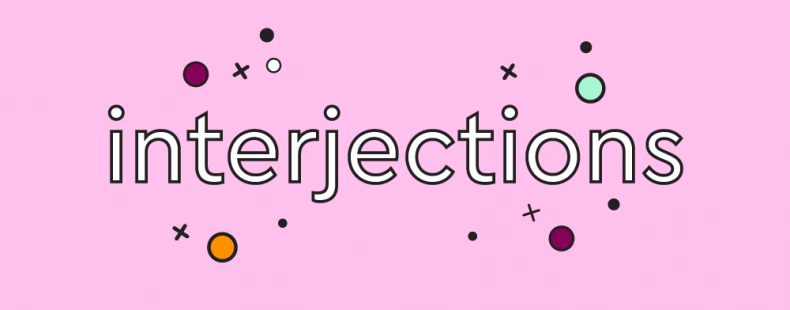We are going to learn about interjections! Stupendous! Amazing! Sensational! Interjections are an excitable part of grammar that can express strong emotions. And that means that we get to use exclamation points. Hooray! Exclamation points! Before we wake up the neighbors with all of this excitement, we first need to learn about what interjections are and how to properly use them in grammar. Grammar! Yay? Yay!
What is an interjection?
An interjection is a word or phrase used in a short exclamation. Interjections are often used to express sudden bursts of emotion such as anger, shock, joy, or confusion. Interjections are not considered to be complete sentences and often lack any major parts of speech. Typically, an interjection is very short: just one to a few words in length. Interjections often end in an exclamation point (!).

Interjection examples
Let’s look at some examples of interjections and how we would use them in writing.
List of interjections
The following list shows some common examples of interjections:
In writing, it is possible to turn anything into an interjection by using an exclamation point. Listed below are just some examples:
- Yes!
- You!
- Unbelievable!
- No way!
- Never!
- Dad!
- Outrageous!
- Interesting!
- Faster!
- Thank you!
- More cowbell!
Interjections in a sentence
In general, there are two main ways that we use interjections in sentences. We can use them by themselves with an exclamation point or we can separate them from a sentence using a comma or commas.
Let’s first look at examples of how we would use interjections by themselves:
- Wow! That alligator is huge!
- Uh-oh! A storm is coming!
- Did you see the acrobats? Amazing! They were incredible!
- When did I want the work done? Today! Get moving!
Because we typically don’t use a question mark and an exclamation point together, an interjection may also end in a question mark if it is expressing confusion, curiosity, or similar emotions:
- Her birthday is tomorrow? Huh? I thought it was next week!
When we use interjections in sentences, we typically separate them by using commas:
- Whoops, I dropped the toys!
- Yikes, look at the size of that spider!
- I just flew into town and, boy, are my arms tired!
- I guess this is as good as it gets, huh?
- Mom said we have to, ugh, clean our rooms!
Get ahead of the writing game with our top grammar tips and tricks. Yay!
When to use interjections
In general, interjections are not used in formal writing and speech. However, they are very common in informal and casual writing in speech. There are several reasons why we would want to use interjections.
Reason #1: We use them naturally
You probably use interjections in your regular speech without even knowing it. When a person is surprised, overcome with joy, or accidentally stubs their toe, they will probably let loose an interjection or two. When people are filled with strong emotions, they are usually too excited to remember proper grammar and might shout interjections instead. At the same time, people often use interjections when they want to be brief or are in a hurry. Interjections are perfect for when you just want to give a short Yeah! or Nope!
Reason #2: They liven up realistic dialogue
In writing, authors often want their dialogue to sound real and like something that people would actually say. Because people often use interjections in their casual speech, you will often see authors sprinkle interjections into dialogue or a character’s inner thoughts. Interjections are also useful to represent grunts, sighs, mumbles, yells, gasps, and other noises people often make.
Reason #3: They communicate intensity
In writing and casual speech, people will often use interjections to catch people’s attention or alert others that something is exciting, dangerous, or important. For example, take a look at the following examples:
- You just won a million dollars.
- Wow! You just won a million dollars! Congratulations!
- I need you to get me a clean towel now.
- Ack! I need you to get me a clean towel! Now!
In each pair, the second example expresses a lot more emotion by using interjections. Even when reading them, you may be able to picture exciting moments that would cause people to become emotional and use interjections.
Interjections vs. conjunctions
Interjections are used much differently than another part of speech known as conjunctions. Conjunctions are words that we use to connect words, phrases, clauses, and sentences. Conjunctions include words such as and, or, but, because, so, also, and unless.
While interjections typically like to hang out by themselves, conjunctions never like to be alone and usually insert themselves into the middle of sentences. The following examples show how we use interjections and conjunctions differently:
- Interjection: Oops! I dropped my keys!
- Conjunction: She likes to eat peanut butter and jelly sandwiches.
- Interjection: No! I’m not ready to go yet! Please!
- Conjunction: Things could be better, but they could also be a lot worse.
- Interjection: Well, this was not my best idea. Sorry!
- Conjunction: You can visit the library whenever you have the chance.
Wow! Have you tried Grammar Coach?
We think Thesaurus.com’s Grammar Coach™ calls for a few interjections and shouts of joy: Fantastic! Hooray! Love it! This writing tool uses machine learning technology uniquely designed to catch grammar and spelling errors. Its Synonym Swap will find the best nouns, adjectives, and more to help say what you really mean, guiding you toward clearer, stronger, writing. Perfect grammar has never been easier.














